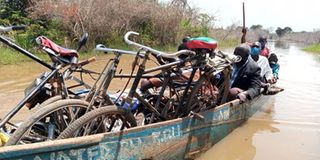Increased disasters call for more robust response

Residents use a canoe to cross a flooded section of a road in Amolatar District in July 2021. Several sub-counties in the district have been affected by floods due to the rising water levels in Lake Kyoga. PHOTO | BILL OKETCH
What you need to know:
- The issue: Disasters
- Our view: There is also a need to support helpless families in the immediate aftermath of disasters. .
Hardly a fortnight goes by without news of a disaster claiming lives and livelihoods.
Devastation of Bugisu Sub-region by landslides and River Nyamwamba bursting its banks in Kasese District caused untold suffering.
To that, you could add foot and mouth disease in the cattle corridor plus insects that destroy banana, coffee and maize plantations. Now, a lengthy drought has caused so much hunger and pain in the north eastern region of Karamoja.
Last week, a hailstorm struck western Uganda, with Bunyangabu District being the most affected.
The downpour, which lasted for close to three hours, left several gardens of rice, beans, cassava, maize, vanilla, and banana plantations destroyed.
More than 700 households are facing starvation.
And none of these disasters are unique to Uganda. Across the world, there is a marked increase in environmental catastrophes.
It is almost impossible to get through a news bulletin without a mention of hurricanes, floods and fires.
Climate change activists have offered sufficient evidence that most of this is down to humans destroying their environment.
This unrelenting environmental degradation cannot be overlooked. Just look around you, there is a wetland that has been or is being reclaimed.
Often, the government offers long-term solutions, especially in adopting modern farming methods to mitigate food scarcity. There is also often a concerted effort to move people from mountainous areas and stop settlement on river banks.
While all these sound good, there is also a need to support helpless families in the immediate aftermath of disasters.
Uganda has a Ministry of Relief, Disaster Preparedness and Refugees under the office of the prime minister. However, so often, even they are caught off-guard and short of funds whenever nature strikes.
At that moment, the long-term solutions suggested by the government remain only talk.
People without food, water and shelter are desperate to survive. This should be the preoccupation of those handed the responsibility of ensuring loss of life is reduced.
When people experience a disaster, they may experience a variety of reactions, many of which are natural responses to difficult situations. Most people show resilience after a disaster. Resilience is the ability to bounce back, cope with adversity, and endure difficult situations. Thankfully, resilience in disaster recovery is ordinary, not extraordinary, and people regularly demonstrate this ability.
Using supportive resources to address stress and other hardships is a critical component of resilience. This is exactly what the Office of the Prime Minister should focus on every time disaster strikes. The next challenge is not far.




